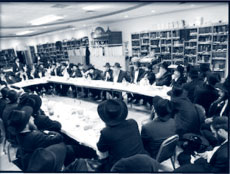I haven’t written about nigleh for awhile, so I wrote a little nigleh today, I hope everyone is interested in kiddushin.
A freilichen Yud gimel Yud daled Kislev vehemshechov, Hatzlocho’dige hachonos to Yud Tes Kislev.
ליל יום ועש”ק, פר’ וישלח, יום הבהיר י”ג כסלו, ערב יום הבהיר י”ד כסלו, שבת שמיני’ מתברך חג החגים י”ט כסלו, שנת “שבעת” לפ”ק
Dear Alumni Sheyichyu!
Sholom U’Brocho!
Thank you as always for the feedback, it is much appreciated.
So, guys, what’s new? I haven’t heard from many of you for awhile, I hope all is well with you, and you’re really getting into the spirit (and spirits) of Kislev. Es heibt zich on Kislev’n!
You want to know what’s new here? You know, much of the same, we try to learn a little, daven a little, and then some more, and so on.
You want to know what’s new in the learning (of course you do)? In the nigleh (and in the middle of Kislev, no less!)? Okay, since I know you’re so interested, I’ll share with you a short idea (we after all have to sometimes including some nigleh Torah thoughts here as well):
In Kiddushin, when a man is mekadesh a woman (I haven’t checked the artscroll, but I can’t imagine that there could be an accurate English translation for Kiddushin), there are 2 basic components; – the act of the Kiddushin, than can happen in one of 3 ways (you’ll have to check them up yourself), and the declaration that needs to accompany the act, that designates the act as one of Kidushin; – the saying “Harei at mekudeshes li”.
In the 5th daf of Kiddushin there is a sugya of נתן הוא ואמרה היא, that establishes that not only must the act of Kiddushin be done by the man and not the woman in order for it to be legitimate, but the verbal part also may only be by the man. If the man does the act (i.e., he gives the money (or ring) to the woman), but the designating the act verbally as an act of Kiddushin is done by the woman (she said “harei ani mekudeshes loch” etc.), that too disqualifies the Kiddushin.
Interestingly, one of the most basic explanations of this halacha, which is also a fundamental idea about Kiddushin in general, is found not in our mesechta but in a Ran (Rabenu Nissim) in Nedarim! The Ran there writes that although the woman must consent to the kiddushin in order for it to be valid, her participation is only passive and she may not take any active role in it. Instead, her role is “to agree to what the man will do (i.e., be mekadesh her), and with this consent she is in effect nullifying her mind and her will (דעתה ורצונה), and considering herself, with regards to the husband, like an ownerless object (כדבר של הפקר), so that he can thus – through his efforts exclusively – take possession of her and bring her under his jurisdiction”.
The Torah itself stipulates that the kiddushin does not take effect if the woman is coerced, and her agreement to the kiddushin is a requisite. Yet, the Ran clarifies, that does not in any way change the fact that the man is the exclusive executor of the kiddushin; what is expected of the woman is merely to . . be completely nothing, to absolutely disregard herself (naturally this is only for the duration of the kiddushin, for the remainder of the marriage the positions may be reversed . . ). Then, and only then, is the man enabled to successfully carry out his part of the deal.
¨¨¨
Tomorrow is the auspicious day of Yud daled Kislev, the anniversary of the Rebbe’s chasuna. It is the day about which the Rebbe stated that “dos iz der tog vos hot farbunden mir mit eich un eich mit mir”, thus it is in a sense also the day that represents the union between the Rebbe and Chassidim. In this relationship between a chosid and the Rebbe, it is important for the chosid to know his place. And for that the words of the Ran are very illuminating.
The Rebbe asks and demands that every one of us should be his shliach, to be committed to carrying out the crucial mission of the Rebbe in the world. On occasion we may even experience some success in this area, and feel – justifiably – that we are accomplishing great things in one area or another. This has the risk of leading to the erroneous conclusion that, hey, we’re also partners in this whole business. Okay, I’m not the senior partner, I’ll grant that, but I am, at least a junior partner (and a rather important one at that).
To this we have to remind ourselves that our primary contribution to the partnership is . . bittul, – total self-nullification. Recognize that you are nothing, hefker, an ownerless object, that – if only we don’t prevent it – the Rebbe will take possession of. Then we can hope to see amazing results in our shlichus, because they are, indeed, really being done by the Rebbe, through our consenting to be the un-hindering vehicle via which the work can get carried out.
To illustrate (and in connection with the fact that it’s chasuna season), here is a story that Chassidim would relate:
In Atzilus there was once great rejoicing; – a new shidduch has been announced. And this was not just any shidduch, – two of the most prominent and worthy beings in existence were going to join in a union of marriage. The chosson was none other than the illustrious Chochmo, the very tippy top of hishtalshelus, and the undisputed leader of atzilus.
And the equally worthy kalla was none other that Malchus, her royal highness all the way from the other end of atzilus. The bringing together of these 2 unequalled mechutanim would undoubtedly be the chasuna of the century!
At the vort, all the who’s who of olamos hoelyonim were present, and all were clamoring to get a better view of the head table, where the choson and kala were sitting, regal and imposing. The L’chayims were flowing like water (I wonder what they drink in atzilus), and, over the din of the band, everyone was excitedly expressing their good wishes.
Presently, it became time for the speeches. The hall (or heichal) became silent, and the chosson began speaking in confident tones. As is customary, he began to speak about his yichus and virtues (yes, of course he was gezha). He explained where his lofty roots were, koach mah, and vehachochma me’ayin timotzei and what that “ayin” refers to etc.
The assembled guests were duly impressed, and Malchus felt a sudden need to match Chochma somewhat, to let people know that she’s also not a nobody. So she, then, took her place at the celestial stand, and began her talk. Malchus, she explained, was also in possession of very important roots, she was rooted in none other than Kesser elyon etc. etc.
Suddenly, in the midst of her oration, there was a great commotion; – Chochma had suddenly indicated that he was calling off the shidduch! It was a scandal, with everyone shocked and outraged! Chochma, however, was adamant, there was no way he was going ahead with it. To the startled guests, he finally explained: “The main virtue of Malchus, and the reason I was so interested in her, is her bittul. The fact that לית לה מגרמה כלום, she is merely a mekabel from the rest of us. The moment that she started seeing herself as a meyucheses as well, and began extolling her own importance, she was no longer attractive to me”!
So, too, it is said to a chosid: ‘Your main virtue, the reason for which you were chosen as a partner in this crucial work, is because of your self-effacement; – your ability to disregard yourself, to display complete bittul to your ‘boss’. The moment that you begin to think that, hey, you’re playing in important part here as well, you lose your whole value.’
This is not just a philosophical idea (or a chidush in nigleh), but has very practical ramifications. Sometimes (or often), a situation may arise in which we feel that in order to carry out our shlichus properly, we need to compromise on some of our standards. Sometimes it appears as if by disregarding one of the Rebbe’s directives, we will be able to be more successful in completing his primary mission:
One person may feel that by compromising on certain halachik standards in his Chabad house, he will be able to attract more members. Another may assume that by being dishonest in his business practices, he will be better able to generously support the Rebbe’s projects around the world. A bochur may conclude that if he “steals” some time from seder to concentrate on mivtzoim, then the Rebbe will surely thank him, because more people will end up putting on tefillin. And so on.
The common denominator in all of these situations is the misconception with regards to what the nature of our part of the partnership is. Our primary position is not an active one, but – first and foremost – a passive one. Our means of contributing to the partnership, of even becoming partners in the first place, is by nullifying ourselves fully and unconditionally. Afterwards, on that foundation, we have to, of course, do.
But, our doing cannot detract from the terms, and the very basis of our relationship with the Rebbe. The basis of our relationship is our viewing ourselves as hefker, and annulling ourselves to the Rebbe. And this has to be the determining factor in everything we do.
And there is a further point in the above-mentioned Ran. The Ran specifically requires of the woman – prior to seeing herself as an ownerless object – to be mevatel her “mind and desires”. In order to reach the stage of being passive partners overall, there are two specific prerequisites. We need to show bittul especially and particularly in the two areas of intellect and desire.
The first point is to contemplate, realize and acknowledge that there is much that we don’t understand. Our approach in life cannot be governed by what makes sense to us, what is logical to our way of thinking. The first step is to be mevatel your mindset to the Rebbe.
And the second step is רצונה, – our will. To reach that stage of total submission, of being true passive partners in the union, we need to focus on subjugating our desires in specific areas. “Batel retzoncho mipnei retzono”! Not everything needs to revolve around my whims. ‘I want this’, and ‘I need that’. Put your wants aside, and make a conscious decision, in very specific areas, that I’m going to substitute what I want with what the Rebbe wants!
So, there you have it. Now you know what we’re spending our time on during seder nigleh, what meseches kidushin is about.
I know, it’s chodesh kislev, and I should be finding something other than nigleh to focus on. And some of you are even thinking, furthermore, what’s the point of spending time on nigleh (even not in Kislev . . ) At least if I learn Chassidus I may feel inspired and be enabled to change. If I take some mashkeh, I may accomplish something with my nefesh habehamis.
But why spend time on nigleh, what’s the point, what will it accomplish?
But then again, we’re not the ones who are accomplishing anything. Our contribution is solely through focusing on what the Rebbe wants from us, on how to be a conduit through which he will accomplish. And, included in what he wants, expects and demands from us is a koch in nigleh (together with everything else). So that is the way we give our passive contribution to the union.
That will be the only legitimate foundation for the union that began on Yud Daled Kislev, and continues to develop to this very day.
And that alone will lead to and allow for the ultimate accomplishment, the final marriage between the Eibishter and kneses Yisroel, with kol sasson vekol simcha etc. and simchas olam al rosham!
L’chaim! May we all do our part to view ourselves as ownerless, and subjugate ourselves to our choson, and may the Eibishter, our choson, in turn do His part, and “take possession of us”, by completing our union with Him in a final and revealed way through the immediate hisgalus of Moshiach Tzidkeinu TUMYM!!!
Rabbi Akiva Wagner
לזכות ר’ שלום מרדכי הלוי בן רבקה, לגאולה וישועה קרובה ושלימה, תומ”י ממש בטוהנוהנ”ג!



